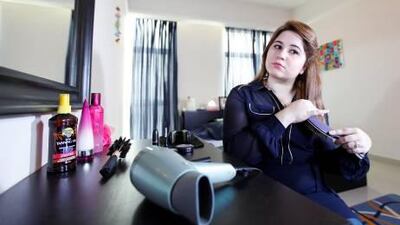Unhealthy diets plus soaring summer temperatures can aggravate hair loss, a condition already prevalent in the UAE, experts warn.
Poor eating habits during Ramadan may contribute to the problem, said Samaia Al Khub, head of the nutrition department at Al Garhoud Private Hospital.
"During this month, we only eat two meals a day, iftar and suhoor," she said. "That gives little opportunity for people to eat the minerals and fibres they need for healthy hair, and an overall healthy diet."
Dr Nameer Abdul Majeed, a dermatologist at Aster Medical Centre, said hair loss complaints were rampant, and there was a notable increase in the summer.
Of an average 45 patients he sees each month, nearly half make inquiries about hair loss. This number increases by at least 10 per cent during the summer, Dr Abdul Majeed said.
"It's a combination of poor diets and a hot climate which results in the flaking of the scalp and leads to hair fall," he said. "A healthy scalp means healthy hair."
According to a survey of 100 women conducted this year by the independent market research company Nielsen for Inversion, an anti-ageing product manufacturer, more than two-thirds said they were experiencing hair loss.
Sixty-five per cent of expatriates cited hair loss as a beauty problem experienced only since moving to the UAE, while nearly a quarter of all respondents associated the problem with the country's hot and humid climate.
More than a third of women in the survey consulted a friend or family member about their symptoms. Thirty-three per cent consulted a dermatologist but just 16 per cent consulted a nutritionist.
After moving to the UAE in 2005, Nabaa Al Dabbagh started noticing considerable hair loss.
Ms Al Dabbagh, 21, said she once had voluminous hair. Now, she has about one third the hair she used to have.
"I notice it when I comb my hair after a shower," she said. "Many strands of hair come out. I didn't experience this back in Iraq and I notice that, when I travel, my hair improves."
Ms Al Dabbagh's hair has become so thin that she says it's difficult to maintain a style. "Every time I style it, it falls within a few hours," she said. "It didn't used to be like this."
Experts played down the relationship between the desalinated water used in the country and hair loss, saying, however, that poor water quality can affect the look of hair.
"Water can cause the hair to be dry, brittle or look dull, but it does not cause the hair to fall," said Michael Ryan, a trichologist based in Dubai. "There is no science to prove that, I've been extensively researching this since I arrived.
"The quality [of water] is actually not that bad. Things like chlorine and silica can have an effect on certain types of hair, but not all hair."
On average, it's normal to lose 100 to 150 hairs a day, Mr Ryan said. but any more and a person should seek professional help.
Dr Riad Roomi, a Dubai-based specialist in hair restoration surgery, also dispelled the notion that the water in the UAE is causing hair loss.
"I get a lot of patients who say I started losing hair when I came to Dubai and attribute it to the water," he said. "The water doesn't reach the hair follicle. The follicle is not on the skin, it's under the skin in the fat layer."
Mr Ryan said any hair loss is a sign of something that occurred at least three to four months ago. Most of the conditions in the country, he said, are categorised as diffused hair loss, a generalised shedding that can be treated.
While genes account for most cases of baldness among men, women can experience hair loss for as many as 50 reasons, including stress, the climate, or an underlying health condition. Yet nutrition is among the most prominent causes, Mr Ryan said.
The hair expert sees between eight and 10 clients a day, almost evenly split between genders. About 90 per cent of the women he sees have some nutritional deficiency, including low levels of iron and a lack of vitamins D and B12.
"We give these clients a diet sheet so they can substitute some of the food they are eating or we supplement," Mr Ryan said.
"Multivitamins are not enough. If you're well, they will keep you ticking along but if you have specifics like hair loss, then you need to address that particular deficiency."

